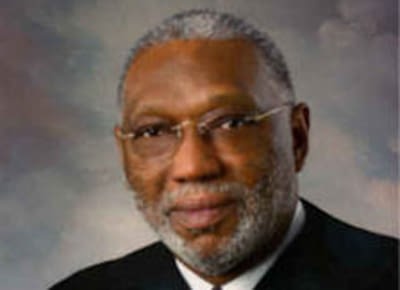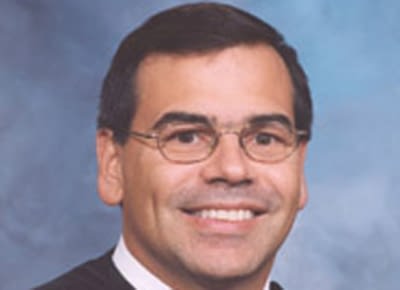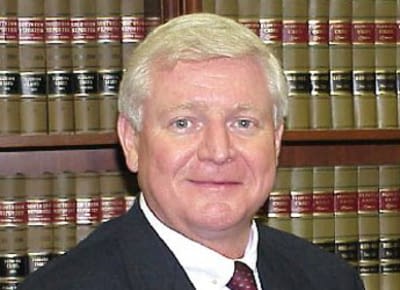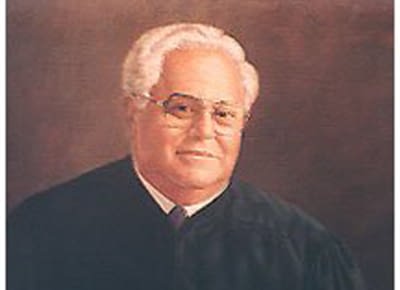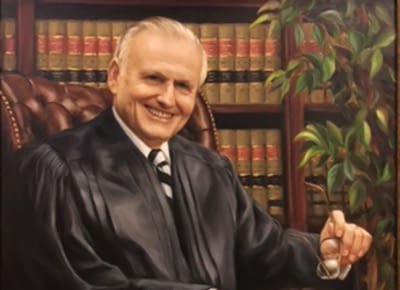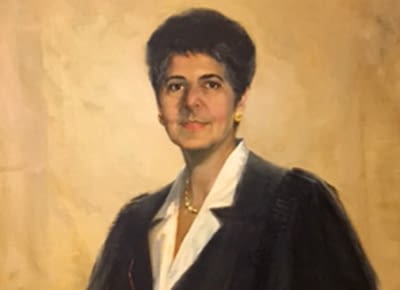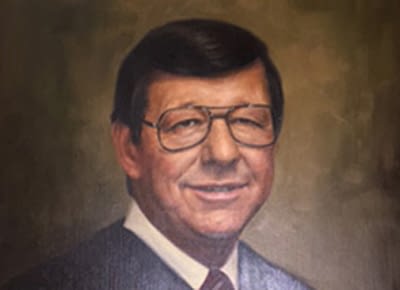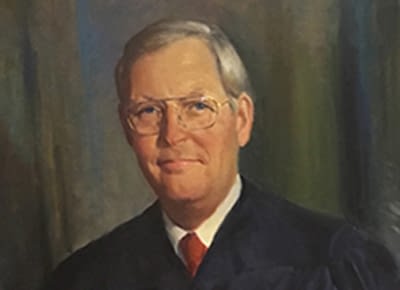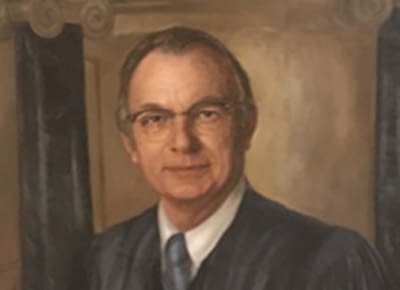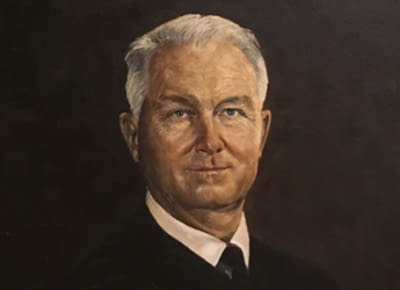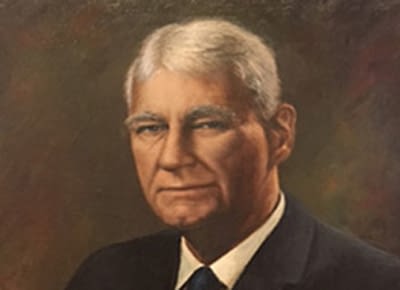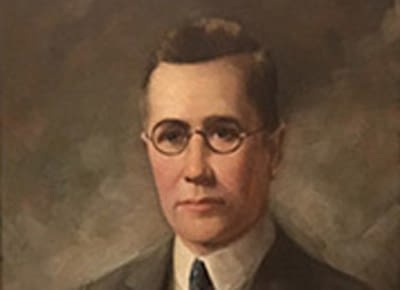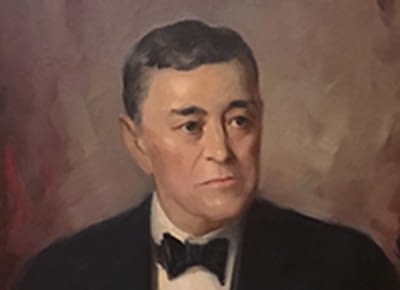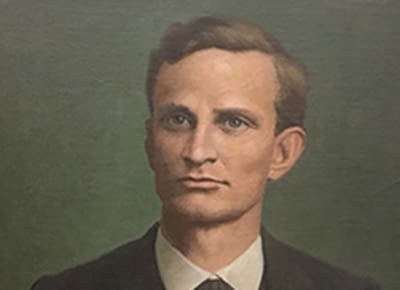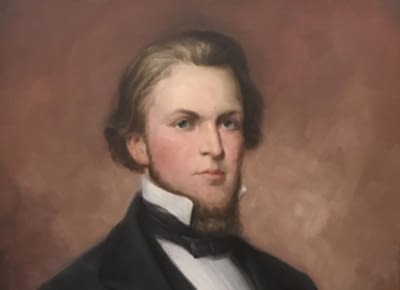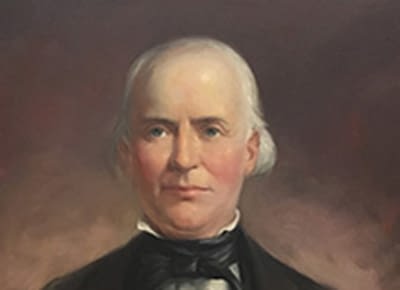Former Justices
As with any institution, the Supreme Court of Florida always has been about people -- most especially those who have served as Justices. Their achievements, lifestyles, and manners weave a rich fabric that has given the Court its distinctive character for more than 175 years.
Former Justices are listed in reverse chronological order below.
Justice Robert J. Luck
Justice Robert J. Luck was the 88th Justice on the Supreme Court. He was appointed in 2019 at an event held at Scheck Hillel Community School, where he attended classes as a child. Justice Luck, like his father before him, was born and raised in Miami-Dade County.
Justice Barbara Lagoa
Justice Barbara Lagoa is the 87th Justice on the Supreme Court and the first Cuban American woman to serve. She was appointed in 2019 by Governor Ron DeSantis.
Justice Alan Lawson
Justice Alan Lawson was the 86th Justice on the Supreme Court and previously served as chief judge of the Fifth District Court of Appeal in the Orlando and Daytona Beach areas. He was appointed in 2016 and retired on August 31, 2022.
Justice James E.C. Perry
Justice James E.C. Perry was the 85th Justice (2009-2016) and founder and president of the Jackie Robinson Sports Association, a baseball league serving 650 at-risk boys and girls – the largest in the nation.
Justice Ricky Polston
Justice Ricky Polston was the 83rd Justice on the Supreme Court and is well known for his work with foster care, including adopting a sibling set of six brothers into his existing family. He was appointed in 2008 and resigned from the Court on March 31, 2023.
Justice Kenneth B. Bell
Justice Kenneth Bell was the 81st Justice (2003-2008). At the time of his appointment, he was the first justice from Pensacola in a century and the first from west of Tallahassee since 1917.
Justice Raoul G. Cantero
Justice Raoul Cantero was the 80th Justice (2002-2008). He is the first Justice of Hispanic descent to sit on the Court and was born to Cuban parents in Madrid, Spain. He is well known for his scholarly legal writing skills as well as being an accomplished fiction writer who has published short stories.
Justice Peggy A. Quince
Justice Peggy A. Quince was the 79th Justice (1998-2019) and was the first African-American woman to serve as Chief Justice (2008-2010). She successfully presided over Florida's state courts system during the worst part of the Great Recession that started in 2008.
Justice R. Fred Lewis
Justice R. Fred Lewis was the 78th Justice (1998-2019) and was well known for his tireless work in classrooms around the state and in teacher education programs. His work in the field of civics education won him the Sandra Day O'Connor Award in 2014.
Justice Barbara J. Pariente
Justice Barbara J. Pariente was the 77th Justice (1997-2019) and became a national symbol in 2003 when she continued work as a Justice through breast cancer treatment, even hearing cases on live television without wearing a wig.
Justice Harry Lee Anstead
Justice Harry Lee Anstead was the 76th Justice (1994-2009). As Chief Justice from 2002 to 2004, he steered the state courts through a difficult financial restructuring required by a constitutional change. When not at the courthouse, he often could be found on another court -- the basketball court.
Justice Charles Talley Wells
Justice Charles Wells was the 75th Justice (1994-2009). While Chief Justice from 2000 to 2002, he steered the courts through two crises. The first were the presidential election cases in the fall of 2000. The second were the terrorist attacks 2001 and the anthrax attacks that soon followed in South Florida. In response, Wells instituted court crisis management planning still in place today.
Justice Major B. Harding
Justice Harding was the 74th Justice (1991-2002). He was well known for always wearing bow ties and for successfully leading the Court as Chief Justice from 1998 to 2000 when Florida's death penalty led to constant lawsuits and controversy due to the state's use of the electric chair, which it finally abandoned in early 2000 while Harding was Chief Justice.
Justice Gerald Kogan
Justice Gerald Kogan was the 73rd Justice (1987-1998). Kogan is best known for his work as Chief Justice from 1996 to 1998 when he started the first live TV broadcasts of court arguments and began using the Web to post court documents for easy access by the public.
Justice Stephen H. Grimes
Former Justice Stephen H. Grimes was the 72nd Justice on the Supreme Court and served from 1987-1997. He is best known for his time as Chief Justice from 1994 to 1996 when the Florida Supreme Court became one of the first courts in the world to have its own website managed by staff.
Justice Rosemary Barkett
Justice Rosemary Barkett was the 71st Justice (1985-1994). She was the first woman to serve on the Court and its first female Chief Justice from 1992 to 1994. Her work in family law and gender bias reforms started trends in the law that continue to this day. Barkett later served on a federal appeals court and then an international claims court in The Hague.
Justice Leander J. Shaw, Jr.
Justice Leander J. Shaw, Jr. was the 70th Justice (1983-2003). He was the first African-American to serve as Chief Justice and only the second black Justice. His career began as a young lawyer in the days of legal segregation. He went on to make his name as a civil rights lawyer challenging the state's last Jim Crow laws.
Justice Raymond Ehrlich
Justice Raymond Ehrlich was the 69th Justice (1981-1991). He oversaw a major renovation and expansion of the Supreme Court Building in Tallahassee while serving as Chief Justice from 1988 to 1990. He also is one of several Justices appointed to the state's highest court without ever serving on a lower court, chosen for his outstanding work as a lawyer.
Justice Parker Lee McDonald
Justice Parker Lee McDonald (1979-1994) was the 68th Justice and is known as the "whistling justice" because he could whistle almost any tune in perfect pitch. He was well known for his pioneering opinions on issues of racial justice, including one forbidding lawyers from excluding potential jurors in court solely because of their race.
Justice James E. Alderman
Justice James Alderman was the 67th Justice (1978-1985). He was a sixth-generation Floridian whose family settled in the Indian River area in the 1830s herding cattle and growing citrus. After serving on the Supreme Court, he left to run his family's cattle ranch west of Fort Pierce.
Justice Frederick Brennan Karl
Justice Frederick Brennan Karl was the 66th Justice (1977-1978). In 1976, he became the last popularly elected Florida Supreme Court Justice. He only served one year on the Court, although he previously had been elected to both the Florida House of Representatives and Senate.
Justice Joseph Woodrow Hatchett
Justice Joseph W. Hatchett was the 65th Justice (1975-1979). He was the first African-American to be appointed to the Supreme Court after rising in the legal profession from humble beginnings in the days of segregation, when his mother was a maid and his father was a fruit orchard worker.
Justice Alan C. Sundberg
Justice Alan Sundberg was the 64th Justice (1975-1982). While on the Court, Sundberg wrote the unanimous 1979 ruling that allowed news cameras in Florida courtrooms, making this the first state in the nation to let TV news crews routinely capture video of trials and appeals.
Justice Arthur J. England, Jr.
Justice Arthur England Jr. was the 63rd Justice (1975-1981). He pioneered the nation’s first program to use the bank interest paid on lawyer trust accounts to finance legal services for the poor, a program soon imitated by other states. He also helped open Florida’s courtrooms to camera coverage and made other reforms favoring open government.
Justice Ben. F. Overton
Justice Ben Overton was the 62nd Justice (1974-1999). He was the first Florida Supreme Court Justice to be selected under the merit selection process still used today. He also was a major driving force behind development of the Florida Supreme Court's first website in 1994, one of the first judicial websites in the world.
Justice Hal P. Dekle
Justice Hal Dekle was the 61st Justice (1971-1975). In 1974, he became involved in a scandal when he received secret drafts in a pending case that eventually led to impeachment proceedings against him. He resigned from the Court under threat of impeachment along with his colleague Justice David McCain.
Justice David Lucius McCain
Justice David McCain was the 60th Justice (1970-1975). He resigned from the Court under threat of impeachment in the same scandal that brought down his colleague Justice Hal Dekle. After leaving the Supreme Court, he was charged with drug-related offenses, went into hiding, and died as a fugitive from the law.
Justice Joseph Arthur Boyd, Jr.
Justice Joe Boyd Jr. was the 59th Justice (1969-1987). During his time on the Court, he was considered for impeachment in the Florida Senate during the same scandal involving his colleagues Justices Hal Dekle and David McCain. But he remained on the Court after successfully defending himself in the impeachment proceedings.
Justice James Calhoun Adkins, Jr.
Justice James C. Adkins was the 58th Justice (1969-1987). His first job at the Florida Supreme Court was as the only legal research assistant employed by the Justices. He was told he was hired because he knew how to type. Adkins was elected as a Justice after serving on the state courts in the Gainesville area for many years.
Justice Vassar Benjamin Carlton
Justice Vassar Carlton was the 57th Justice (1969-1974. As chief justice, he implemented the major constitutional revisions to the structure and jurisdiction of the Florida judiciary that had been approved by state voters in November 1972.
Justice Wade Lee Hopping
Justice Wade Hopping was the 56th Justice (1968-1969). His term was the shortest in court history, lasting only five months after he lost a contested campaign for his seat in November 1968. Before that, Hopping worked for Florida Governor Claude Kirk as a legal, legislative, and administrative adviser.
Justice Richard William Ervin
Justice Richard Ervin was the 55th Justice (1964-1975). He previously worked as a staff clerk at the Florida House of Representatives. In 1948, he was elected as Florida's Attorney General and served in that position until his appointment to the Florida Supreme Court in 1964.
Justice Millard Fillmore Caldwell
Justice Millard Caldwell was the 54th Justice (1962-1969). Before his appointment to the Court, he served in both the Florida and United States House of Representatives and was active in politics. In 1945, he was sworn in as Florida's 29th Governor based in part on his promise to maintain the state's segregation laws.
Justice Stephen C. O'Connell
Justice Stephen O'Connell (1955-1967) was the 53rd Justice on the Supreme Court. His life was deeply interwoven with the University of Florida, where he had attended school. Twelve years after his appointment to the Court, he left to become president of the University of Florida, helping his alma mater through troubled times in the late 1960s and the Vietnam war protests.
Justice Benjamin Campbell Thornal
Justice B. Campbell Thornal was the 52nd Justice (1955-1970), coming to the Court after many years of law practice in the Orlando area. While on the court, he worked for equal treatment of minority groups under the law. He died of cancer while still a member of the Court in 1970.
Justice Edward Harris Drew
Justice E. Harris Drew was the 51st Justice (1952-1971). Governor Fuller Warren appointed Drew to the Florida Supreme Court in 1952. But the Justices determined that a special election was warranted, and Drew had to campaign for the seat. He won by only a few votes but later went on the serve twice as the Court's Chief Justice.
Justice John Elie Mathews
Justice John E. Mathews was the 50th Justice (1951-1954). He also served in both the Florida House and Senate, though his career was marked by efforts to maintain Florida's segregation laws. Mathews helped lead an effort to create the Florida District Courts of Appeal to help ease the appellate workload that had bottlenecked at the Florida Supreme Court.
Justice Bonnie Kaslo Roberts
Justice Bonnie Kaslo Roberts was the 49th Justice (1949-1976). Roberts was influential in establishing the District Court of Appeal system and the Florida public defender system, and he also served on state constitutional revision commissions in 1968 and 1972.
Justice Tolbert Frank Hobson
Justice Frank Hobson was the 48th Justice (1948-1962. He served as a circuit judge in Pinellas County for 20 years. In 1948, he was appointed to fill a vacancy on the Florida Supreme Court and was elected twice more, eventually serving as Chief Justice. Health problems caused him to retire from the Court in 1962.
Justice Paul Dryden Barns
Justice Paul Barnes was the 47th Justice (1946-1949). Upon retirement from the Supreme Court, he taught at the University of Miami College of Law for 24 years.
Justice Harold Leon "Tom" Sebring
Justice Tom Sebring was the 46th Justice (1943-1955). He was appointed by U.S. President Harry Truman to be one of the judges at the Nuremberg War Crimes Tribunal in 1946.
Justice Alto Lee Adams
In 1940, the Florida legislature added a seventh justice to the Florida Supreme Court, and Governor Fred Cone appointed Adams to that position. He served approximately 12 years on two different occasions.
Justice Elwyn Thomas
Justice Thomas was the 44th Justice (1938-1969). He drafted and helped pass the constitutional amendment that created the District Courts of Appeal in 1957.
Justice Roy Harrison Chapman
Justice Roy H. Chapman was the 43rd Justice (1937-1952). While chief justice, Chapman oversaw the funding and start of construction on the present Supreme Court Building.
Justice Fred Henry Davis
Justice Fred Davis was the 42nd Justice (1931-1937). He is one of the few justices to hold positions in all three branches of government. He was Speaker of the House, Attorney General, and Chief Justice.
Justice Rivers Henderson Buford
Justice Rivers Buford was the 41st Justice (1925-1948). He was known for his "colorful" personality and retired just before the justices started wearing black robes in court, swearing he would never wear one.
Justice Louie Willard Strum
Justice Louie Willard Strum was the 40th Justice (1925-1931). He served as Jacksonville's city attorney before his appointment to the Supreme Court.
Justice Armstead Brown
Justice Armstead Brown was the 39th Justice (1925-1946). Five of his personal diaries from the 1940s are available on the library's website. They present a vivid picture of life on the court, and in Florida and elsewhere on the home front, during World War II.
Justice William Glenn Terrell
Justice Glenn Terrell was the 38th Justice (1923-1964). He is the longest serving supreme court justice, dying while still in office. In 1964, after his death, a collection of his writings was published, The Judicial Sayings of Justice Glenn Terrell, compiled by M. Lewis Hall, a copy of which is in the Florida Supreme Court Library’s collection.
Justice Thomas Franklin West
Justice Thomas Franklin West was the 37th Justice (1917-1925). He was elected to both the Florida House and Senate between 1903 and 1912. He was also ran successfully for attorney general.
Justice Jefferson Beale Browne
Justice Jefferson Browne was the 36th Justice (1917-1925). In 1890, he ran successfully for public office as a state senator. In his first legislative session, he was voted senate president.
Justice William Hull Ellis
Justice William Ellis was the 35th Justice (1915-1938). He ran for and was elected to the Florida Supreme Court at the age 47.
Justice Charles Breckenridge Parkhill
Justice Charles Parkhill was the 34th Justice (1905-1911). He served in the U. S. Army during World War I.
Justice James Bryan Whitfield
Justice James Whitfield was the 33rd Justice (1904-1943). He authored many authoritative opinions, including Montgomery v. State, from 1908, in which it was found unlawful to exclude prospective jurors from trials because of their race.
Justice William Adams Hocker
Justice William Hocker was the 32nd Justice (1903-1915). He served in the legislature in 1876 and again in 1891 and also served as a delegate to the 1885 Florida Constitutional Convention.
Justice Evelyn Croom Maxwell
Justice Evelyn Maxwell was the 31st Justice (1902-1904). When the legislature created three additional justice positions in 1902, he was appointed as one of the new justices.
Justice Robert Spratt Cockrell
Justice Robert Cockrell was the 30th Justice (1902-1917). He was faculty at the University of Florida College of law where several future justices passed through his classes.
Justice Thomas M. Shackleford
Justice Thomas Shackleford was the 29th Justice (1902-1917). He served for 15 years, twice as Chief Justice.
Justice Francis Beauregard Carter
Justice Francis Beauregard Carter was the 28th Justice (1897-1905). He left the Court to become a circuit court judge in Pensacola.
Justice Benjamin Sullivan Liddon
Justice Benjamin Liddon was the 27th Justice (1894-1897). His powers of oratory were considerable, and fellow attorneys remembered “an irresistible voice that charmed and swayed juries.”
Justice Milton Harvey Mabry
Justice Milton Mabry was the 26th Justice (1891-1903). After he retired, former colleagues on the court persuaded him to return to Tallahassee as Supreme Court clerk.
Justice Robert Fenwick Taylor
Justice Robert Fenwick Taylor was the 25th Justice (1891-1925). During those years he authored 564 opinions and participated in over 8,000 decisions, amounting to more than 75% of all the cases decided by the court from its beginning until 1925.
Justice Henry Laurens Mitchell
Justice Henry Mitchel was the 24th Justice (1888-1890). From 1893-1897 he also served as Florida's 16th governor.
Justice Geoge Pettus Raney
Justice George Raney was the 23rd Justice (1885-1894). After retirement from the Court, he became a well-known elder statesman in Tallahassee, campaigning to keep the city as the state capital in 1900.
Justice George Gray Mcwhorter
Justice George Gray McWhorter was the 22nd Justice (1885-1887). In 1877, McWhorter was elected to the Florida House of Representatives, and then elected Speaker of the House. After serving on the Court for two years, he was appointed head of the Railroad Commission.
Justice Robert Bruce Van Valkenburgh
Justice Robert Van Valkenburgh was the 21st Justice (1874-1888). In late 1865, President Andrew Johnson appointed Van Valkenburgh as U.S. Minister to Japan, where on one occasion, he commandeered a warship and, with 300 volunteers, rescued the Japanese prime minister from capture by rebels trying to take over the government.
Justice Franklin D. Fraser
Justice Franklin Fraser was the 20th Justice (1873-1874). Colleagues characterized his legal style as careful, painstaking, and tenacious.
Justice James Diament Westcott, Jr.
Justice James D. Westcott was the 19th Justice (1868-1885). He authored 267 opinions in the 17 years between his appointment and his retirement in 1885.
Justice Ossian Bingley Hart
Justice Ossian Hart was the 18th Justice (1868-1873). He was the first native-born Floridian to serve on the Supreme Court and was the eldest son of one of the founders of the city of Jacksonville. He also served as Florida's 10th governor.
Justice Edwin M. Randall
Justice Edwin Randall was the 17th Justice on the Supreme Court. He served from 1868-1885 all as Chief Justice. Making him the longest-serving chief justice in the state's history.
Justice Samuel James Douglas
Justice Samuel Douglas was the 16th Justice (1866-1868). At age 29, was the youngest man to sit on the territorial court of appeals.
Justice James Mcnair Baker
Justice James Baker was the 15th Justice (1865-1868). Baker County is named after him.
Justice Augustus Emmet Maxwell
Justice Augustus Maxwell was the 14th Justice (1865-1866 & 1887-1890) and the first attorney admitted to practice before the Florida Supreme Court.
Justice David Shelby Walker
Justice David Shelby Walker was the 13th Justice (1860-1865). He held many positions in government, including Florida's eighth governor.
Justice William Augustus Forward
Justice William Augustus Forward was the 12th Justice (1860-1865) and was also elected to both the Florida House and Senate.
Justice Bird Murphy Pearson
Justice Bird Pearson was the 11th Justice (1856 - 1859) and elected into office to complete the term of Justice Thomas Douglas.
Justice Charles H. Dupont
Justice Charles H. DuPont was the 10th Justice (1854-1868) and one of the wealthiest planters in the state.
Justice Benjamin D. Wright
Justice Benjamin Wright was the ninth Justice (1853) and was a newspaper editor for the Pensacola Gazette.
Justice Albert Gallatin Semmes
Justice Albert Semmes was the eighth Justice (1851 - 1853) and represented his area at the 1838 Florida Constitutional Convention.
Justice Leslie Atchinson Thompson
Justice Leslie Thompson was the seventh Justice of the Supreme Court and served from 1851-1853.
Justice Walker Anderson
Former Justice Walker Anderson was the sixth Justice of the Supreme Court and served from 1851-1853.
Justice Joseph Bradford Lancaster
Justice Joseph Lancaster was the fifth Justice (1848-1850) and also served as mayor of Jacksonville.
Justice George W. Macrae
Justice George Macrae is known as the "mystery justice" because little is known about him and no actual photograph or portrait has been found. This portrait from the imagination of the artist. He served in 1847.
Justice George Sydney Hawkins
Justice George Hawkins was the third Justice on the Supreme Court and served from 1846 to 1850.
Justice Thomas Baltzell
Justice Thomas Baltzell was the second Justice and served from 1846 to 1850 and from 1854 to 1860. He participated in the Territorial Council and was a member of the Constitutional Convention in 1838.
Justice Thomas Douglas
The first Justice of the Court and its first Chief Justice, Thomas Douglas served from 1846-1850 and 1854-1855.
Contact Information
Florida Supreme Court
500 South Duval Street
Tallahassee, Florida
32399-1925 | EMAIL
Talking with Justices and Staff








